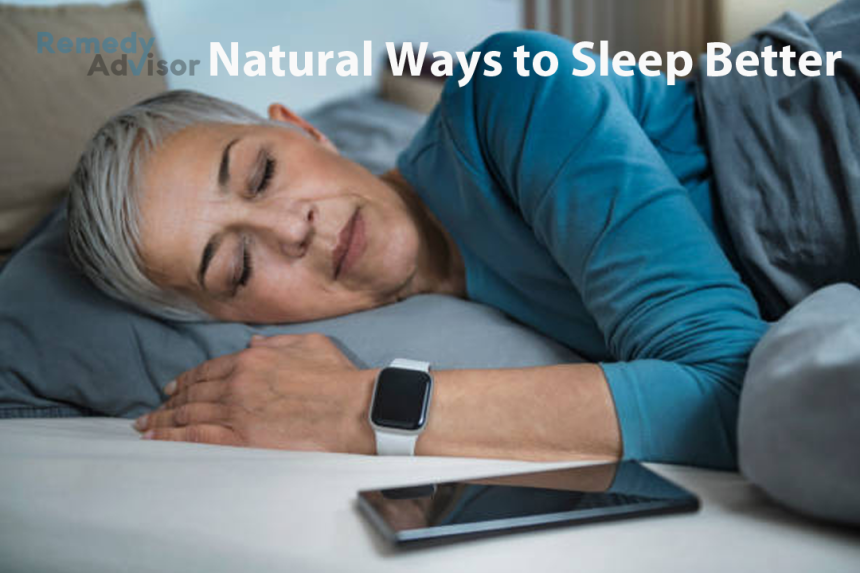Bypass the sleeping pills and focus on these natural approaches to better sleep and, as a result, a healthier blood pressure:
Keep it dark
Don’t allow any light in your bedroom, as any hint of light can have an effect on your pineal gland and melatonin production. Therefore, keep the drapes closed, put up blackout shades, or wear an eye mask. Don’t keep a night-light in your room, and cover up your alarm clock if it glows. Light signals your brain and disrupts your natural rhythms at night. Naturally, you want to be safe when you get up during the night, so use a low-voltage orange or amber colored night-light that does not expose you to the short light wavelengths from regular bulbs.
Keep it cool
Experts say the optimal sleeping temperature is between sixty and sixty-eight degrees. Because your internal body temperature drops to its lowest level about four hours into your sleep pattern, it’s believed that a lower room temperature aids natural sleep.
Keep it quiet
Do you like to be frightened awake? I didn’t think so. A loud alarm clock can be stressful. Consider using an alarm that simulates sunrise by gradually increasing the amount of light in your room or one that slowly raises the sound of soothing music.
Hide the time
If you wake up during the night, do you always check the alarm clock to see what time it is? Worrying about the time can add to your stress and make it more difficult to get quality sleep.
Choose your bed partners carefully
Bed partners, both human and those of the four-legged variety, can interfere with your sleep if they are restless or snore. You may need to consider separate sleeping arrangements.
Reserve your bed for sleep and sex
Avoid the habit of using your bed for working on your computer, watching television, eating, or reading (although reading something soothing, spiritual, or uplifting can be helpful). View your bed as your comfortable transportation vehicle for sleep.
Keep it comfortable
Speaking of comfort, do you like your bed pillow(s)? Is your mattress firm or soft enough (depending on your needs?) Do your bed linens provide the right amount of warmth?
Follow a regular routine
Your body and blood pressure will respond best if you establish and follow a regular time to go to bed and get up every day of the week. This will help your body recognize a pattern, which will make it easier for you to fall asleep, stay asleep, and wake up more refreshed.
Relax before bedtime
Turn off the horror movie on television, put down the mystery thriller, and get off the treadmill. Prepare for bedtime by easing into sleep: meditate; listen to soothing music; get a foot massage; use aromatherapy (a diffuser, not candles!); practice guided visualization. You don’t need to always use the same routine, but have stress-relieving things you can do before you go to bed each night.
Reduce your need for nighttime bathroom trips
That means don’t consume any kinds of liquids in two hours of going to bed and go to the bathroom immediately before getting into bed.
Choose a wise after-dinner snack

If you feel you need something to eat a few hours before going to bed, choose something high in protein, sugar-free or low in sugar, and low in fat. Foods that contain L-tryptophan, an amino acid that can help melatonin production and thus boost sleep potential, are a good choice. A two-hundred- calorie serving of the following foods provides a significant amount of tryptophan: cooked spinach (600mg), turkey or chicken (400-500 mg), low-fat cottage cheese or low-fat cheddar cheese (330-400 mg), and tofu (400 mg).
Beware of electromagnetic fields
Not everyone agrees with this idea, but some experts say that electromagnetic fields (EMFs), which radiate from high-power lines and electrical devices such as televisions, electric blankets, and refrigerators, can interfere with the production of melatonin and serotonin by the pineal gland. EMFs may reduce heart rate and disrupt electrical activity in the brain while you sleep.
Consider melatonin supplements
Short-term use (no more than two months is recommended) of melatonin supplements may help with difficulty falling asleep or staying asleep. The most common side effects of melatonin are dizziness, daytime sleepiness, and headache. Be sure to talk to your doctor before taking melatonin. Although melatonin is typically a safe supplement, it can interact with blood-thinning medications, drugs to treat diabetes, birth control pills, and immune suppressants. The suggested dose can range from 0.5 milligrams per day up to 3 to 5 milligrams, depending on your sleep problem and how you respond to the hormone. The best advice is to start low and slow.
Keep your feet warm
Feet typically have the poorest circulation in the body, and so they tend to get cold. If you wear socks to bed and keep your tootsies warm, you can reduce your chances of waking up during the night.
Bring in the noise (white, that is)
Some people say they can fall asleep much better if they have white noise or nature sounds in the background. Scores of relaxation and sleep CDs are available, including those that involve guided visualization and meditation to help you drift into sleep within a few minutes. If you haven’t tried it, borrow some ‘nature sound CDs from the library and try them.
Avoid alcohol
Although drinking alcohol may make you sleepy, you will likely wake up several hours later and be unable to go back to sleep. Drinking alcohol also prevents the brain from entering deep stages of sleep, which your body needs to rejuvenate.
Be cautious about caffeine
Some people feel the effects of caffeine for many hours, while others seem to be able to have a cup of coffee and go right to sleep. If you are uncertain about how your body responds to caffeine, keep track of your coffee, cola, and other caffeine-containing liquid intake and how you sleep at night. You may need to make some adjustments.
Exercise
Once again, physical activity can benefit your blood pressure, but be sure to do your exercising at least a few hours before you go to bed. Boosting your endorphins and heart rate right before bedtime can actually make falling asleep more difficult.







